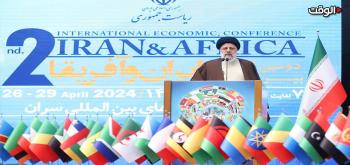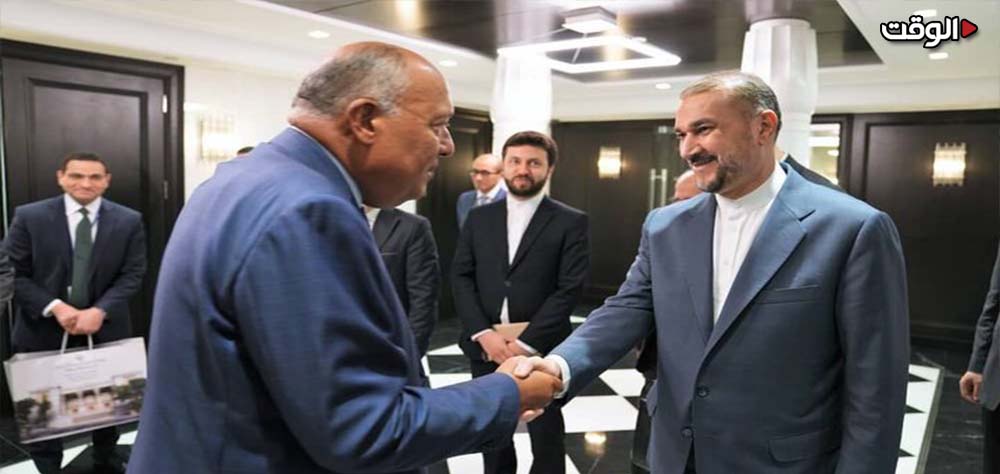Alwaght- Though taking place in a geographically small area, Gaza war leaves considerable security, economic, and political impacts on the region and the world. Due to the large scale of the Israeli massacre in Gaza, this war has give rise to new political groupings in the region. The escalation of tensions in the Red Sea between Ansarullah and the American-led coalition that is part of the Gaza war has driven some regional countries to more cooperation. This process is starting from Iran-Egypt station.
In this connection, some reports suggested that Cairo is negotiating with Yemen’s Ansarullah leaders and senior Iranian officials to de-escalate military tensions in the Red Sea for the fear of further damage to the ship traffic in the Suez Canal which is a major source of Egypt’s income.
The Arabic service of the Israeli news channel i24 in a report shed light on the aspects of Iranian-Egyptian cooperation and the negative impacts of the tensions in the Red Sea. The network held that the economic impacts of the Red Sea clashes on Egypt will push its national currency, pound, to record lows.
Egypt, which has had a crisis-stricken economy in the past decade and most of its revenues are provided by Suez Canal, is extremely worried about the conflicts in the Red Sea and is trying with the help of Iran, as a stabilizing and influential country in West Asia, to overcome this situation.
In this regard, there have been reports of possible visit of Iranian Foreign Minister Hussein Amir-Abdollahian to Cairo. Political experts maintain that return of diplomatic relations between the two countries is not merely an Egyptian decision and is connected to regional and international developments and stances. In March 2023, Saudi Arabia made a similar decision, followed by other Persian Gulf Arab monarchies.
Egyptian promises to Tehran
Unofficial media reports indicate that Egypt has confirmed during talks with Tehran that it will not join any international action against Ansarullah and has made clear to the US the danger of a military solution. Egypt believes that they must find a permanent solution to the root cause of the crisis represented by the ongoing war in Gaza.
i24 reported that Ansarullah, for its part, appreciated Egyptian intention not to join the American-headed naval coalition and assured Cairo that it it not interested to broaden range of its operations, especially after the US-Britain attacks on Yemen and that its attacks only target ships sailing to the occupied Palestinian territories or affiliated with Israel.
Tehran-Cairo relations warm-up
Although Tehran authorities have not confirmed or denied Amir-Abdullahian’s visit to Cairo, since the government of President Seyyed Ibrahim Raisi took office, there has been major progress in the relations between the two countries, which can end four decades of diplomatic hiatus.
The two countries began to mend their four-decade frayed ties since 2021 when Egyptian President Abdel Fattah el-Sisi met Iranian FM on the sidelines of Baghdad regional cooperation summit. In November 2022, the head of Egypt’s intelligence agency and the vice president of Iran had a conversation on the sidelines of the Sharm El-Sheikh climate change conference. Also, in July 2023, during El-Sisi’s trip to Muscat, Iranian and Egyptian diplomats met each other in this country with the mediation of Oman and discussed important bilateral and regional issues.
Things were not limited to this meetings, and after a reconciliation deal was signed between Iran and Saudi Arabia last year, Tehran-Cairo relations saw a new page opened, with Egyptian officials voicing readiness to resume diplomatic ties. Shortly later, Egyptian Tourism Ministry announced it will issue visas for Iranians. Iran’s President Raisi was one of the first to congratulate El-Sisi for winning a new presidential term last December.
For Iran and Egypt, the normalization of relations does not mean settling all differences, but it is a way to strengthen bilateral and regional common interests, and given the Gaza war and the rising tensions in the Red Sea, both sides are trying to resume their relations and prevent the crisis from spilling over to the whole region.
i24 continued that Iran sees resumption of ties with one of the great actors in Arab world a major political achievement to change the balance of power and solidify its position in the Arab countries, especially in the US allies.
Iran and Egypt are seriously opposed to the crimes committed by the Israeli regime in Gaza and are trying to put pressure on this regime to end the war and allow humanitarian aid into this besieged strip. Gaza war has united the ranks of the Islamic countries as they share a voice condemning the Israeli crimes and provided an opportunity for Tehran and Cairo to tighten the noose on this occupying enemy and isolate it with the participation of other regional countries.
Economic interests
Given the geopolitical changes that have taken on the international stage over the past two years, the role of such countries as Iran that are a linking ring between the East and the West has emerged more than ever. According to i24, Egypt under El-Sisi prioritizes reservations and economic interests in designing its policy and approach towards Iran and seeks revenues through access to the Iranian market and tourists.
Egypt has many ancient archaeology and tourism sites that attract millions of people from all over the world every year and injects a lot of income into the treasury of this country. Therefore, the visit of Iranian tourists to Egypt can positively drive the tourism boom in this country.
i24 continues that Cairo is interested to have Tehran’s backing for future reconstruction in Iraq and Syria which are Iran’s spheres of influence.
In energy area, Egypt eyes Iranian help to use Syrian and Lebanese gas reserves in Eastern Mediterranean. Also, it can buy Iranian oil with Iraqi mediation.
At security level, Egypt wants to put an end to Red Sea tensions with Iranian help and restore its Suez Canal incomes by stabilizing the region. Egypt’s income from the Suez Canal reached $9.4 billion last fiscal year, and according to estimates, if the tensions in Palestine end, it will reach $11 billion this year.
The Egyptian officials are well aware that Iran is the biggest supporter and ally of Ansarullah in the region and they are trying to ensure the flow of their trade from the Red Sea with the help of Tehran. Although Ansarullah’s operation is not directed against any country but the Israeli regime and its Western allies, insecurity in the Red Sea will by itself have a negative impact on the trade. Sana’a leaders have repeatedly emphasized that the main cause of insecurity and instability in the Red Sea is the US and the Israeli regime, which are fanning the flames of tensions in the region, and with the cessation of Tel Aviv’s crimes in Gaza, stability will be restored to the Red Sea.
From another aspect, Iran has interests behind closer ties to Egypt represented by contributing to neutralization of Western sanctions on Tehran.
Challenges ahead of détente
Despite their readiness for détente, Tehran and Cairo face some challenges ahead of any reconciliatory process. The Israeli website adds that Egypt’s essential approach to normalization with Iran remains conservative and dominated by regional and international variables. Analysts believe that the continuation of steps towards rapprochement and normalization of Egypt’s relations with Iran depends on two main variables: First: Success of the experience of Iran-Saudi Arabia détente. This will encourage Cairo to take a similar step. Second: the green light of the US and Israel. It is assumed that Egypt will not normalize its relations with Iran until it makes sure that this issue will not stir a crisis in its relations with the US and Israel.
Now, firstly and with start of Gaza war and spillover of crisis to the Red Sea that potentially jeopardizes the trade and oil interests of Saudi Arabia, Saudi Arabia has shown a wise approach rejecting the American demand to join the Western alliance against Ansarullah and maintaining agreements and dialogue with the Yemeni movement. This means that Tehran-Riyadh agreement has weathered its first major challenge. Secondly, Egyptian-Israeli relations growing strained because of Gaza war and the Israeli push to displace Gaza people and change the realities of the region using force have brought Tehran-Cairo stances closer in this important Islamic-Arab case.
Israeli newspaper Yedioth Ahronoth on Monday in a report titled Egypt, Iran tighten relations amid Israel’s war in Gaza warned about this bad news for Tel Aviv, quoting a diplomatic source as saying that “what’s happening in the region strengthens the relations between Egypt and Iran due to the two countries’ common interests and because Iran is considered a central player in the region given its close relations with the warring parties.”
Israeli concerns
There is no doubt that Iran building closeness to Egyptian, indeed, next to the occupied Palestinian territories is considered as posing a major threat to the Israelis. From Tel Aviv viewpoint, Iranian-Egyptian rapprochement will bear damages to Israeli interests. The Israelis are following the Iranian-Arab de-escalation project with great concern as such a project helps Iran to boost its regional influence and challenge Israeli normalization plan with Arab world. The recent war in Gaza has driven Arab countries away from the path of normalization with the Israeli regime while at the same time spurred Iranian-Arab convergence against Israeli plans in the region.
Israeli Prime Minister Benjamin Netanyahu and other government hardliners claim that Iran’s presence in Egypt will strengthen Gaza resistance groups and subsequently leaded to heightened threats against Israeli settlers. Actually, after Gaza war, Iranian-Egyptian potential diplomatic rapprochement has turned into a nightmare for Tel Aviv leaders and it is not unlikely they put the skids under this process.



























